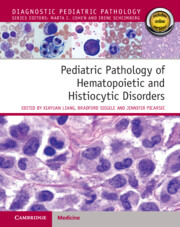Book contents
- Pediatric Pathology of Hematopoietic and Histiocytic Disorders
- Pediatric Pathology of Hematopoietic and Histiocytic Disorders
- Copyright page
- Epigraph
- Contents
- Contributors
- Section I General Hematology and Hematopathology
- Section II Non-Neoplastic Hematologic Disorders of Blood and Bone Marrow
- Chapter 3 Anemia
- Chapter 4 Bone Marrow Failure Syndromes
- Chapter 5 Inherited Leukocyte Disorders
- Chapter 6 Other Conditions
- Section III Non-Neoplastic Disorders of Extramedullary Lymphoid Tissues
- Section IV Neoplastic Disorders of Bone Marrow
- Section V Mature Lymphoid Neoplasms
- Section VI Histiocytic Disorders and Neoplasms
- Index
- References
Chapter 3 - Anemia
from Section II - Non-Neoplastic Hematologic Disorders of Blood and Bone Marrow
Published online by Cambridge University Press: 25 January 2024
- Pediatric Pathology of Hematopoietic and Histiocytic Disorders
- Pediatric Pathology of Hematopoietic and Histiocytic Disorders
- Copyright page
- Epigraph
- Contents
- Contributors
- Section I General Hematology and Hematopathology
- Section II Non-Neoplastic Hematologic Disorders of Blood and Bone Marrow
- Chapter 3 Anemia
- Chapter 4 Bone Marrow Failure Syndromes
- Chapter 5 Inherited Leukocyte Disorders
- Chapter 6 Other Conditions
- Section III Non-Neoplastic Disorders of Extramedullary Lymphoid Tissues
- Section IV Neoplastic Disorders of Bone Marrow
- Section V Mature Lymphoid Neoplasms
- Section VI Histiocytic Disorders and Neoplasms
- Index
- References
Summary
Anemia is defined as a hemoglobin (Hb) level or red blood cell (RBC) mass of less than the 5th percentile for age [1]. Approximately 20% of American children have anemia [1]. Most children with anemia are asymptomatic, and the condition is often discovered incidentally on routine laboratory testing.
Hemoglobin is a tetrameric protein composed of two pairs of globin chains complexed with four heme groups and is responsible for the transportation of oxygen of RBCs [2,3]. Normal adult RBCs contain 97% hemoglobin A (HbA; α2β2), 2% HbA2 (α2δ2), and 1% fetal Hb (HbF; α2γ2). At birth, HbF is predominant. Within the first year of life, it is largely replaced by HbA [3].
- Type
- Chapter
- Information
- Publisher: Cambridge University PressPrint publication year: 2024

